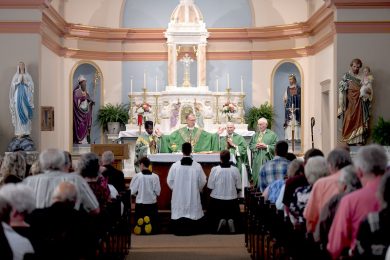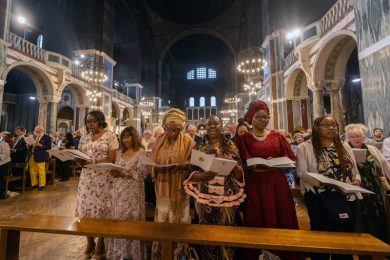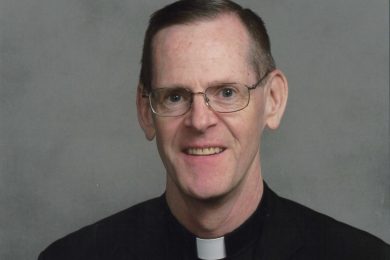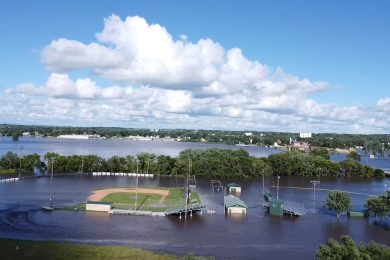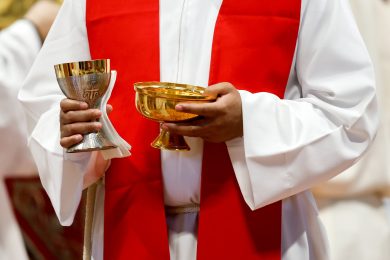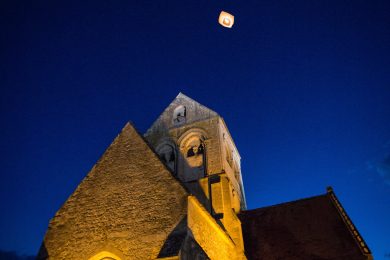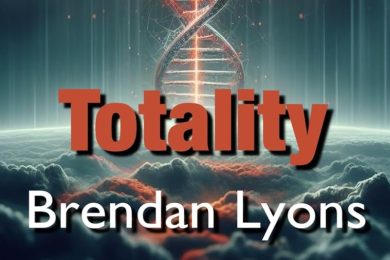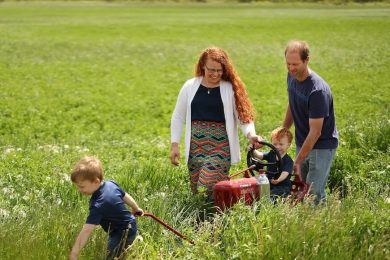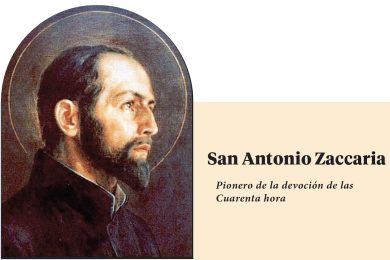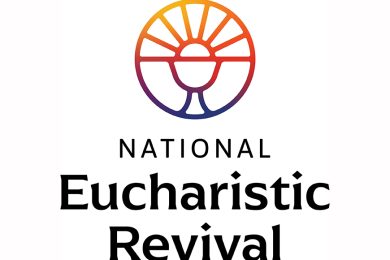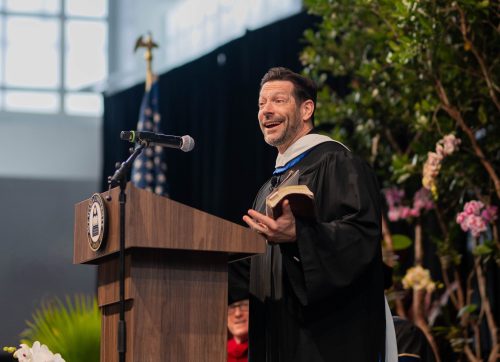A top NASA official May 24 challenged the graduating class of 2024 at the College of the Holy Cross in Worcester, Massachusetts, “to dare mighty things together.”
In her commencement address, Laurie Leshin, director of NASA’s Jet Propulsion Laboratory and former president of Worcester Polytechnic Institute, spoke about the forward-looking, visionary pioneers who have paved the way for space exploration success throughout the years, and stressed the importance of being audacious and pushing boundaries.
“You certainly inherit an imperfect world — a planet, a society, with flaws. But I have faith in you,” said Leshin, who is a geochemist and space scientist and the first woman to lead the Jet Propulsion Laboratory in its 87-year history. “You have the vision. You have the intelligence, and the drive. And if you can think big, pursue audacious ideas, and do so with passion and commitment, mind-blowing things are possible.”
On May 19 at Fairfield University in Connecticut, Bishop Frank J. Caggiano talked to the graduates there about “setting the world on fire.”
“St. Ignatius speaks of setting the world on fire, but that fire begins deep within you and me,” said Bishop Caggiano, who has headed the Diocese of Bridgeport, Connecticut, since 2013. “It’s a passion, a burning desire for each of us to seek greater excellence, more authentic integrity, to challenge the accepted beliefs of modern society.”
He encouraged graduates to “be the architects of hope and transformation,” and to “accept the mantle of transformational leadership … to be able to bring hope and change to the people entrusted to (their) care and a world that is looking for a better way.”
At Georgetown University in Washington, Auxiliary Bishop Evelio Menjívar delivered a commencement address to the Georgetown University College of Arts & Sciences class of 2024 May 18. The dignity of the individual, a hallmark of Catholic theology, was at the center of the address by the Washington auxiliary, the first Salvadoran-born bishop in the United States.
He reflected on the many difficulties facing those whose home countries are no longer a safe place to call home. He also recalled his own journey as a teenager to the U.S., with his brother, because of the violence and unrest in his home country, while his family remained in El Salvador.
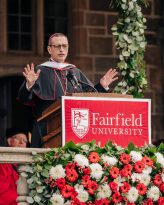
“In 1990, I arrived in Los Angeles, California, with only a change of clothes in a backpack, but full of dreams,” he said, adding that like most immigrants, he took any job he could get, including janitorial work. At night he learned English and studied for the high school equivalency degree.
He felt called to the priesthood, and after completing his college and seminary studies, he was ordained for the Washington Archdiocese May 29, 2004. Pope Francis named him an auxiliary for Washington in December 2022 and he was ordained a bishop Feb. 21, 2023.
“We all must start somewhere and seize every opportunity that life offers us,” said the bishop. “None of us is wholly self-sufficient. Each of us is dependent upon others. We are part of an ecosystem called family, community, church and world. For just as none of us arrived where we are without the involvement of others, even for our daily food, so too do others depend upon us. This means that we should give back to others the good we have received.”
Bishop Menjivar told the graduates that with their talents and their “great education” — which he called “the gift of a lifetime” — they “have what it takes to help bring about a world of truth, justice, solidarity and peace. When all is said and done, that is the measure of true success, and I urge you to never accept less.”
During May 11 commencement ceremonies at Franciscan University of Steubenville, Ohio, Supreme Court Justice Samuel Alito received an honorary doctorate in Christian ethics “for his decades of exemplary public service and tireless efforts to protect and uphold justice and the rule of law.”
The graduates and guests gave Justice Alito a standing ovation when Franciscan Father Dave Pivonka, president of Franciscan University, noted Justice Alito’s legacy writing the majority opinions for landmark cases including Burwell v. Hobby Lobby Stores, a 2014 decision upholding religious liberty, and Dobbs v. Jackson Women’s Health Organization, the 2022 decision, which overturned the court’s 1973 Roe v. Wade decision and its related jurisprudence on abortion.
Alito delivered an address at both the morning and afternoon ceremonies where he told the graduates to “go out boldly and engage the world.”
He offered advice on how to do so inspired by the U.S. Constitution. This advice included recognizing the fundamental principles of life and guarding against unwise change.
“There will be troubling times, times of temptation,” he said. “If we have fixed and clear principles, principles that are written in bold letters in our hearts, we may be able to find our way through, but if we don’t, we could easily go astray.”
He highlighted the need to respect tradition while also engaging in civil discourse.
For the Constitution’s framers, “their ideal was a person of real character who was strong, prudent, temperate, and fair — a person who was willing to sacrifice for the good of others,” he said. “They were confident that ordinary people are capable of responsible self-government if they did not try to stop the people from making changes that don’t undermine what really matters. In the same way, your challenge during troubled times will be to distinguish between dedication to principles that never change and mere nostalgia.”
Alito also encouraged the graduates to draw strength from their relationships with others.
Tania Tetlow, president of Fordham University, addressed graduates at Spring Hill College in Mobile, Alabama, during their commencement ceremony May 11.
“Graduates your job is to love yourself … without judgment, to strive always to be better but not driven by shame, but by love … because to love yourself,” Tetlow said, “means you’ll be capable of loving other people well and that my friends is the sweetness of life, the whole point. Spend your days drunk with gratitude for your blessings, even when life is hard, especially when life is hard.”
“When you find the strength to look outwards and turn off the worry voice in your head, you will achieve … freedom to focus on what matters, freedom to experience joy, to appreciate what you have. Graduates, you have overcome so much to be here today,” she added.
Tetlow acknowledged that the class of 2024 had been through a lot with the COVID-19 pandemic, which for most, if not all, had forced their high schools to cancel their 2020 graduation ceremonies.
“There is much about the pandemic we’re eager to forget: the fear and uncertainty, the isolation and loneliness, veering from panic to boredom and back again, and for many of us the loss and the grief,” she said. “Graduates, you lost years of crucial moments of joy that we cannot give you back. … You have become fiercely focused on what matters. You refuse to accept the brokenness of the world. You face the challenges ahead with courage. You look for truth with curiosity and openness, and today, especially today, you remember to find joy.”

Award-winning, multi-platinum singer-songwriter John Legend told Loyola Marymount University’s class of 2024 May 4, “I cannot wait to see how you will harness the power of love.”
He emphasized the significance of love as a healing and unifying force. “I like to think that these last few years have instilled in you the recognition that love matters most of all — the kind of love that has defined my life’s journey,” Legend said. “With love, we can see ourselves in each other. We can discover our abiding mutuality. With love, we can serve. With love, we can heal. We can build. We can do — and undo.”
In a May 4 commencement address at Ave Maria University in Florida, Father Mike Schmitz reflected on his experiences in a wilderness survival program after his own graduation. He described taking a bus to the trailhead and then hiking increasingly more rugged and more narrow trails. He and the other hikers then broke off into smaller teams, left the faded rough tracks, and bushwhacked their way through the wilderness to a meeting point.
“This is your bushwhacking moment,” said the Diocese of Duluth, Minnesota, priest, who has gained a national following for, among other things, his popular “The Bible in a Year” and “The Catechism in a Year” podcasts. “You got to this day and the track runs out. This is the day you enter the wilderness. You might know the name of your vocation, but you don’t know where it will lead you. … God wants you to live in the wilderness, to find your way through it.”
He talked about how young people can question the goodness of God when faced with grief, tragedy and challenges. “How can God be a good Father if he leaves me in so much pain?” Father Schmitz asked. “God doesn’t rescue us. God wants more for us than we want for ourselves. God wants you to become stronger. Your faith doesn’t grow in a place without opposition.”
He also emphasized a daily trust in God, saying, “God says: Trust me today. God only gives us enough light for one more step.”
– – –
OSV News staff compiled this round-up report.

